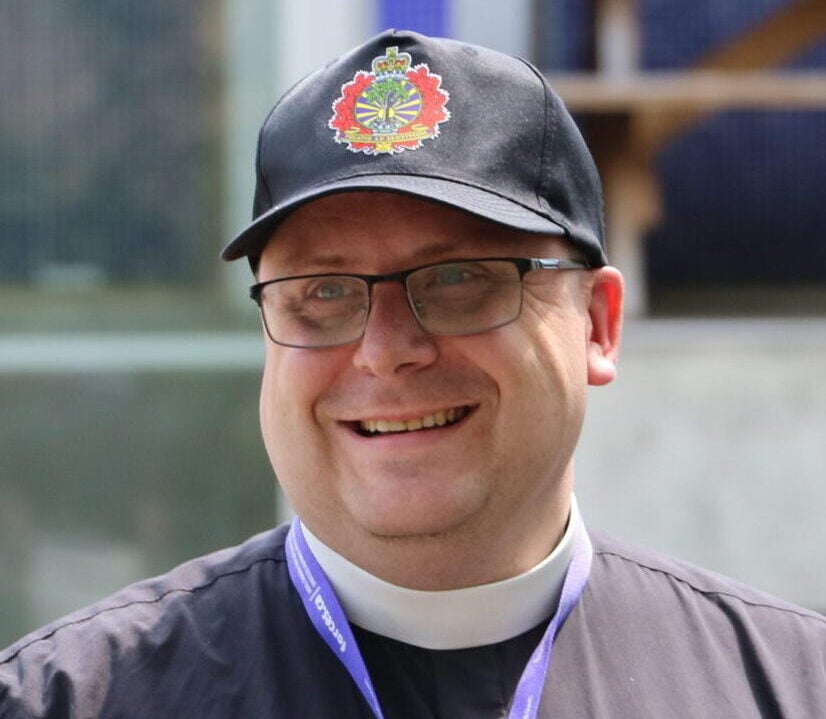Editor’s Note: I asked Deacon Jacob Friesen to answer a few questions as he begins his ordained ministry with us. Welcome, Jacob and Samantha! We’re thrilled you’re with us.
MK+: Tell us a little about yourself!
JF: I was born in Victoria, BC. Both my parents served as Anglican military chaplains in the Canadian Armed Forces (CAF), so we moved around Canada often. I have lived in Victoria, BC; Suffield, AB; Cold Lake, AB; Petawawa, ON; Ottawa, ON; Fredericton, NB; Toronto, ON; and now Brandon! I did my undergraduate degree at St Thomas University in Fredericton, where I received a BA with honours in Philosophy. I attended seminary at Trinity College at the University of Toronto, and graduated with an MDiv this year. I am preparing to serve as a military chaplain. The Diocese of Brandon is where I will obtain the civilian ministry experience required for military chaplains. This year has been a big one for me because, in addition to graduating from seminary, completing Basic Training, moving to Brandon, and being ordained, on Thanksgiving weekend I am getting married to the woman I love, Samantha.
MK+: What brought you to the Diocese of Brandon?
JF: At least two things have brought me to the Diocese of Brandon. First, I have great respect for Bishop William. I first met Bishop William at the Ask and Imagine program at Huron College in 2013. My experience at that program was a major moment in my formation as a Christian and laid the groundwork for my discernment of my call to ordained ministry in the years that followed. Thus, when I had to find a bishop under whom to be formed in the first couple years of my ministry, Bishop William (and therefore the Diocese of Brandon) seemed a natural choice.
Second, I think that God is doing really interesting things in this diocese, and that He is calling the church in this diocese to share in this work. The Diocese of Brandon is at the vanguard of the important work of reconciliation with indigenous peoples, and of supporting distinct, Indigenous Christian identities and communities within the Anglican tradition. The Diocese of Brandon also has a long tradition of lay leadership, which will likely be crucial for the wider church in the years to come. Thus, there is lots to learn here, and there are many opportunities for experiences which I can bring with me wherever my ministry takes me.
MK+: Have you had any experience with the Diocese prior to your ordination?
JF: I was blessed with the opportunity to complete a virtual placement in the Tri-Valley Parish under the supervision of the Rev’d Matt Koovisk in the summer of 2021. The placement was a great experience- I learned a lot, and Fr. Matt was an excellent supervisor. I look forward to visiting the Tri-Valley parish in person soon!
MK+: What made you decide to go into ordained ministry?
JF: A few things brought me to ordained ministry. First, I grew up surrounded by strong role models for ordained ministry. My parents are both Anglican priests and my grandfather on my father’s side was a Baptist minister. I saw that they were doing interesting and important work which made a positive impact on the lives of others. Second, I have long been involved in various aspects of church life – parish council, committees, altar guild, lay reading, biblical and theological studies, and so forth. I found all this volunteer work to be rewarding and enjoyable, so it seemed natural to make a career out of it! Finally, I am particularly drawn to the specific context for ordained ministry for which I am preparing- military chaplaincy. Military chaplains have a major positive impact on morale and operational effectiveness in the CAF. As religious leaders who are ordained- or in possession of an equivalent qualification- chaplains care for CAF members and their families in ways which are distinct from any other caregiving profession. In these troubled times, I am grateful to be able to serve both God and country.
MK+: What excites you about moving to the Diocese of Brandon?
JF: I am excited to serve under Bishop William, to share in the important work the diocese is undertaking with Indigenous communities, and to learn from the lay leaders who are crucial to this diocese. I am also excited to experience a region in which I have never lived, but in which many of my forebears settled as Mennonites.


